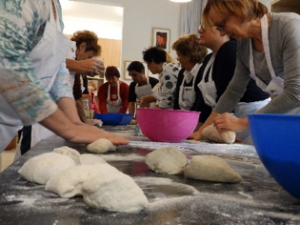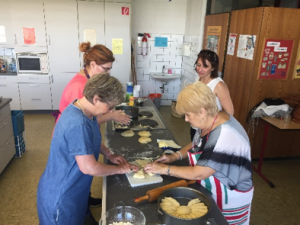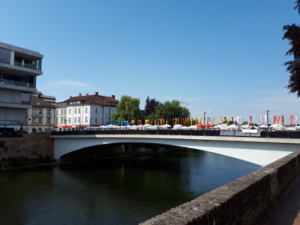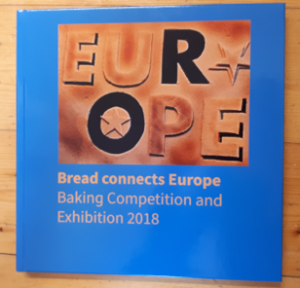Carmen Stadelhofer, Head of ILEU e.V., President of DANET
Project Tastes of Danube. Bread connects
1st February 2017-31th July 2019
Supported by the State Ministry Baden-Württemberg, the town of Ulm and many other sponsors
Many partners in all Danube Countries
Photo: Ana Mitioglu
Background information:
For centuries, bread has been a symbol of community sharing and responsibility in almost every culture and religion in Europe. Bread is a topic in numerous traditions, festivities and customs on local, national and international level. The project’s central aim is to foster awareness for our common cultural roots in the Danube area and in Europe. In addition, by the topic “bread” the Danube community shall be united. It is about the appreciation of national cultural heritage and finding transnational commonalities. Citizens of all ages, ethnic origins and social and educational milieus are invited to experience bread as a common intangible cultural heritage, which can be found in many facets on local and transnational level. Bread shall be experienced as culturally specific and identity-sustaining measure for different target groups in the Danube area and demonstrate unity in diversity. Intergenerational, intercultural and inclusive baking activities on local and European level and qualification trainings are aimed at presenting bread as a cultural good in its diversity. The long-term goal is to create a virtual “Cultural Route of Bread along the Danube” based on the results of the project. The results are presented in the multilingual project website http://bread-connects.tastes-of-danube.eu/
Aim of the project
To experience “bread” as a common intangible cultural heritage amongst Europeans. The results demonstrate that bread is more than a staple food. For centuries, bread has been a symbol of community, sharing and responsibility in almost every culture and religion in Europe. Bread is a topic in numerous traditions, festivities and customs on local, national and international levels. In this project, bread is a culturally specific and identity-sustaining measure for different target groups. European awareness and identity will be fostered by cooperating with local groups of different ethnics and various groups of other European countries. Also promoted will be intercultural and intergenerational dialogue, opportunities for participation will be given to less privileged people, elderly, women, unemployed people, and people with special needs and also to people with higher educational interests. Methods of general adult education and social work can be adapted to the different needs and abilities of the target groups. Local actions will also help uniting the people.
Work packages
- Creating a Cultural Bread Route
Participants conduct research on historical and actual bread baking houses, public bread ovens, bread festivals, local traditions etc. The results are presented in the multilingual project website. - Qualification
16 selected representatives of different countries were introduced to the method “Baking as a social event”, developed by Dr. N. Grigorova, Breadhouse Network Sofia.
Photo: Liljana Cumura from Serbia
- Implementation, transfer and evaluation of the method Bread connects / Bread Baking week
The method “Baking as a social event” was implemented in local contexts for different target groups. There will be further implementations in as many places as possible in collaboration with local institutions organising transcultural events. In 2019, participants will organize national qualification seminars with the aim of introducing the methods to new disseminators.
In October 2017, a Danube Bread-Baking Week took place in all Danube countries. Similarities and differences in bread traditions became very clear during this week and in the website.
Start of Danube Bread-Baking week in October 2017 in Ulm
photo: Bertram Wegemer
- International Partner meeting in Ulm 12th-15th of July 2018 during the 11th Danube-Festival Ulm/Neu-Ulm
On 13th July, an international conference on Intangible Cultural Heritage in the Danube Area took place (150 participants, 86 from 10 Danube countries). International experts gave inspiring lectures. Relevant topics of the project were presented in workshops.
Photo: Hans Brendle
On July 14th, intercultural groups baked goods for breakfast on the following day.
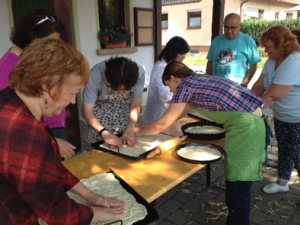
Photos: Dr Erla Spatz-Zöllner
On July 15th a big Danube Bridge Breakfast took place in Ulm. 30 civic organisations from Ulm region and the international partners invited citizens for snacks and intercultural exchange. More than 2000 people participated.
Photo: Marina Iser
Photo: Ana Zlibut
- Competition and Exhibition Bread connects Europe – Create and Bake
International baking contest in which contestants had to present their baked vision of Europe. 92 contributions from private individuals, baking apprentices and school classes were handed in (from 8 countries). Pictures of the baked goods were exhibited in Ulm and published in a book. Winners were invited to take part in the conference on cultural heritage in Ulm
Photo: Marina Iser
- Give a sign of friendship
People from all over Europe were invited to participate in the online photo action on the subject of bread. Around 3.000 people participated with 1000 photos
Documentation at the project website
http://bread-connects.tastes-of-danube.eu/
More about the project
The starting point of the Danube-Networkers’ project are traditions and everyday customs on local and national level. Diversity is integrated as an existing fact. The low-threshold method helps people to see and feel that “European thinking and acting” does not lack on personal and national identity – on the contrary, it can be an interesting and enriching experience as it shows European unity while promoting diversity.
The project’s design focuses on sustainability (process as well as outcome) and long-term effects. The project partners and their organizations will carry out the project aims by providing the infrastructure for community-building actions.
The experiences and insights from this project will be utilised in new applications on the topic Bread culture or Food culture in Europe as cultural heritage. The content of the project will foster diversity and similarity of food as well as the transfer of local and national customs and traditions within Europe.
The project bears strong references to the aims of PA 3, 9 and 10 of EUSR (Promotion of civil societies in the Danube region, qualification trainings for adults as well as promotion of cultural heritage and tourism).
The project focuses on civil society institutions, universities and schools from the Danube countries and Europe in general. The geographical extension of the project makes clear that Bread as cultural heritage is not only an identity-building measure for the Danube region, but for the whole of Europe. Transferred can be methods on local environments. By enlarging the existing Bread-Network to Western Europe the dimension of bread as cultural heritage of all Europeans can be demonstrated. The associations of the Universities of the Third Age, which are already working in cooperation with DANET and ILEU, are key partners, as they have access to many interested senior citizens who are contemporary witnesses and who are interested in research on cultural heritage and intergenerational exchange. DANET is already in touch with interested facilities of general adult education in Italy and France. Thus, new contacts between European citizens will be fostered. The project’s European scope is increasing and the friendship ribbon of the Danube becomes one for all European citizens. In the future, further aspects of the common European intangible cultural heritage such as dances and songs can be explored.


